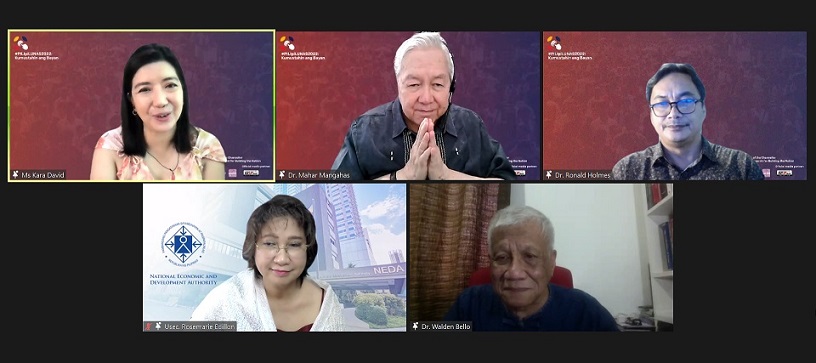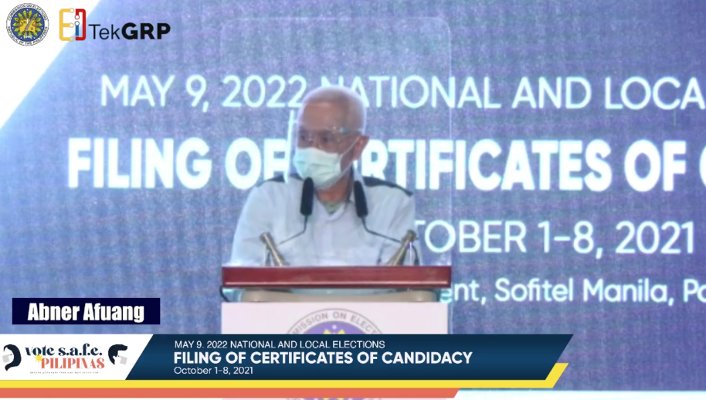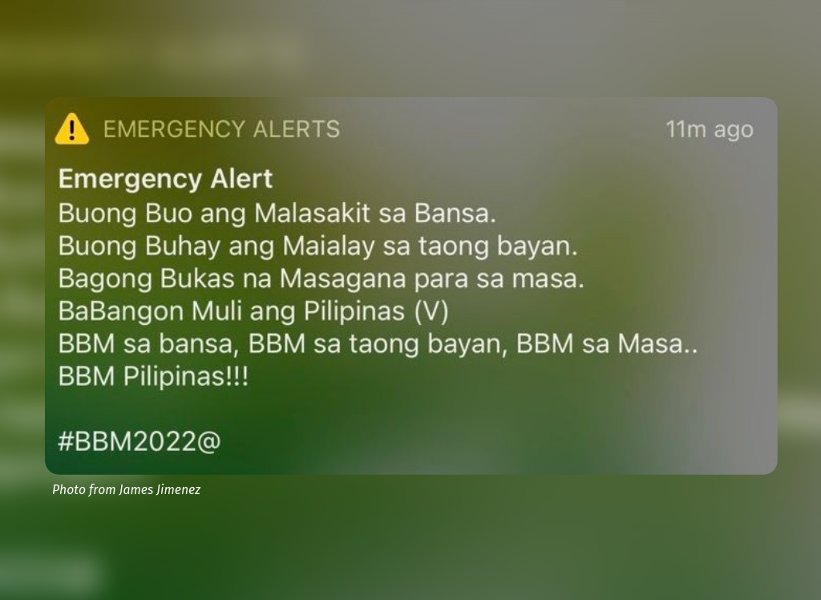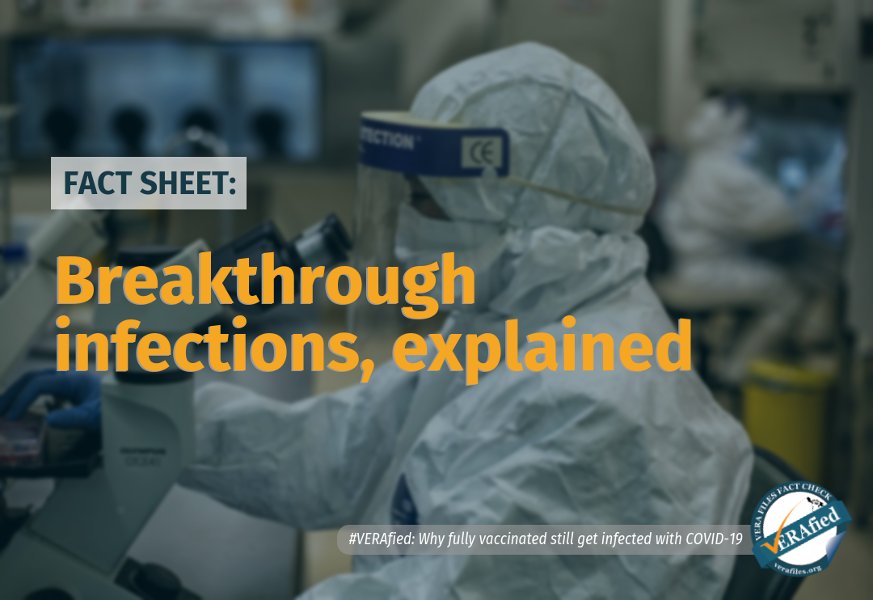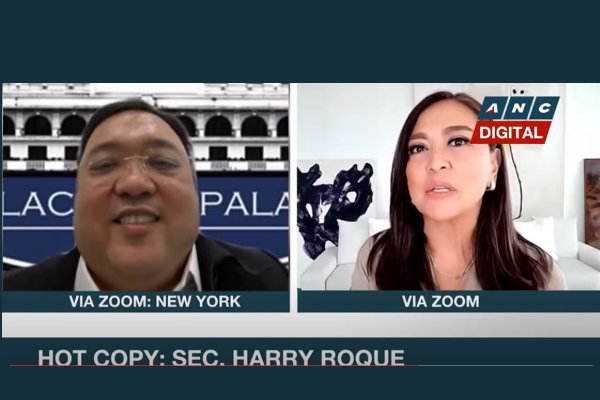Public dismay over the government’s handling of the Covid-19 pandemic has lowered the approval rating of the administration but not so much of President Rodrigo Duterte himself, the head of a public opinion polling body said Friday.
In an online forum titled “#PILIpiLUNAS2022: Kumustahin ang Bayan,” Ronald Holmes, president of Pulse Asia Research Inc., said the crippling health crisis may be a key issue in the 2022 elections as Filipinos continue to reel from the impact of the coronavirus disease 2019 (COVID-19) pandemic.
“Kung hindi maso-solusyunan, at medyo mahirap solusyunan itong pagpapatuloy ng COVID-19… makakaapekto sa pagboto ng mamamayan sa susunod na halalan… Talagang ang mga Pilipino alam kung ano ang dapat nilang makuha sa gobyerno.Alam nila na merong hindi naibibigay at maaari nilang panagutin ang pamahalaan — maging sa lokal o pambansang halalan,” he noted.
(If it won’t be solved, and it’s a bit difficult to solve the spread of COVID-19, it will affect how people vote in the next elections. Filipinos really know what they should get from the government. They know that some things weren’t provided and they may hold the government accountable even in the local or national elections.)
Speakers at the Aug. 6 forum sponsored by the University of the Philippines (UP) discussed how Filipinos perceive their quality of life amid the crippling health crisis, and how the government expects to adjust to the new normal and push for economic recovery as the country prepares for elections.
According to a June 7-16 Pulse Asia survey, nine out of 10 Filipinos believe government response to the pandemic has been inadequate. Among the primary concerns of the respondents were the lack of financial aid to those affected by the pandemic (19.4%), the slow and inefficient vaccination process (18.7%), and the lack of discipline in implementing protocols (9.5%).
In addition, 96% of respondents in a July survey said they worried that they or their relatives would contract COVID-19, up 3% from February.
But Holmes noted that while Filipinos blame the government for the state of affairs in the country, they do not hold officials, including the president, directly accountable.
“Ang pambansang administrasyon, hinihiwalay nila sa pangulo,” Holmed noted without providing figures. “Meron silang sinasang-ayunan na ginagawa ng pangulo. Meron silang hindi sinasang-ayunan. Sa sarili nila iyon na pagtatasa, pero sa ilang Filipino ‘yung nagawa ng pangulo na tama ay sapat na para suportahan ang pangulo.”
(They separate the administration from the president. They agree and disagree on things the president does according to their own evaluation. For some Filipinos, what the president does right is enough to support him.)
Walden Bello, co-chairperson of the Bangkok-based research and advocacy institute Focus on the Global South, attributed Duterte’s sustained popularity despite the pandemic to “charismatic politics” where the people give more weight to a politician’s personality than his achievements.
“You have a situation where [Duterte] may not be delivering at all on economic programs, pero mataas pa rin ang approval rating kasi hindi na nakabase sa rational calculation of interest on voters (but approval rating is still high because it’s not based on voters’ rational calculation of interest),” he said.
But Holmes noted that 30% of Filipinos are also dissatisfied with the administration’s efforts to control inflation.
“Dahan-dahan nang hindi nasisiyahan ang mamamayan sa patugon ng pambansang administrasyon sa mga pangunahing usapin na para sa kanila ay napakahalaga na dapat tugunan kaagad, Holmes said.
(Citizens are slowly becoming unhappy with the administration’s response to primary issues that they they think are urgent and should be addressed immediately.)
Unhappiness as measured by poverty, hunger
This was backed by Mahar Mangahas, president and co-founder of social research institution Social Weather Stations (SWS), who said that Filipinos have become unhappy because they are hungry and poor due to pandemic-related lockdowns and quarantine restrictions.
In the SWS survey for the second quarter this year, 13.6% of the respondents said they experienced hunger, 11.5% had moderate hunger, while 2.1% experience severe hunger — all higher than figures before the COVID-19 pandemic, Mangahas pointed out.
A June 23-26 SWS survey showed that 48% of Filipinos considered themselves poor, 29% felt they were borderline poor, while 23% said they were not poor.
“It’s a social obligation for the country as a whole, for the government to lessen this undeserved unhappiness by lessening hunger. Because hunger, the government can definitely do something about,” Mangahas said.
What Filipinos look for in a leader
According to Holmes, Filipinos look for three qualities for their future leader: pro-poor, can enforce the law fairly, and can fight corruption.
“Symbolically, kung meron siyang projection o meron siyang record ng pagtulong sa mga mahihirap, eto yung tinitingnan na pinakamahalagang katangian (if he has a record of helping the poor, this is seen as the most important characteristic),” Holmes said.
Both Mangahas and Holmes lamented that the country’s electoral system is focused on personalities and less on issues and programs of government. Mangahas said that personality politics has distorted the party list system.
“Ngayon hindi na alam ng mga tao kung ano ang iba’t ibang mga party. Sasabihin lang nila, ‘Ah ako, andoon ako sa party ni Mr. X. Basta kung saan siya’ (Now people don’t know what the different party lists are. They’ll just say, ‘Ah, I’ll vote for the party list of Mr. X, wherever he is),” he noted.
Bello, on the other hand, was a little more optimistic, saying that there could be a breakthrough if a “winning personality” with a good program of government emerged.
He said that the attributes of a “non-rational charismatic” politician like Duterte is very hard to transfer to another person, even if that individual is his child.This would give a candidate with a government agenda fighting chance in the 2022 elections, Bello pointed out.
“(The coming elections) might be really an interesting time,” he explained. “Is charisma transferable? I don’t think so. If it’s not transferable, then this proliferation of candidates might offer an opportunity for a program-based candidate.”
Voter turnout
But first, the voters must be able to cast their ballots.
Holmes warned that if COVID-19 continued to spread uncontrolled, the health crisis could affect voter turnout in next year’s elections.
“Lumalabas, ang voter turnout bumaba ng mga 20 puntos. So eto ang dapat nating paghandaaan dahil sa ibang bansa nagawa naman nila ang ibang mga paraan ng pagboto (It turns out that voter turnout decreased by 20 points. We should prepare for that because other countries have done other methods for voting,) he said.
Mangahas, however, pointed out that Filipinos in general like to vote so it is important that they are protected from the pandemic.
“If there’s a chance that they will not be infected, they will go…. It’s just a matter of whether they’ll be afraid to infect themselves,” he said.
In the run-up to the national elections, the PILIpiLUNAS2022: Kumustahin ang Bayan series of roundtable discussions is aimed at coming up with a government agenda for the polls and beyond, according to Fidel Nemenzo, chancellor of UP Diliman. For this purpose, a task force was created to build the blueprint for nation building, he said.
